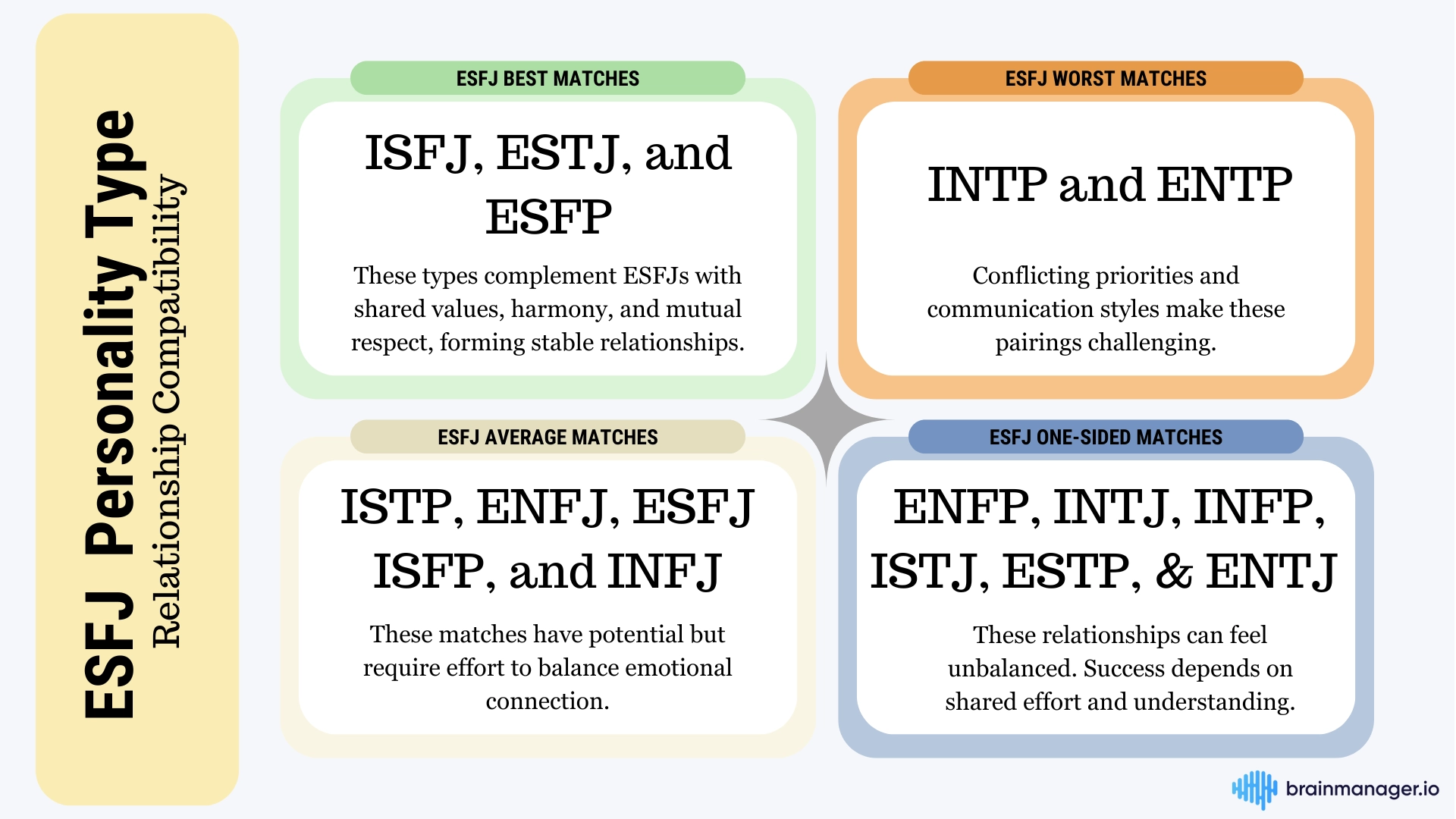ESFJ Compatibility: Relationship Needs, Turnoffs, Strengths, and Best Matches for ESFJ Personality
Are you curious about ESFJ compatibility with other MBTI personality types? Whether you’re an ESFJ or in a relationship with one, understanding the ESFJ’s relationship needs, turnoffs, and best matches can enhance your connections and strengthen your bond. Learn the ESFJ relationship dynamics, from perfect to challenging pairings, and uncover practical tips to build lasting connections, regardless of compatibility!


Back
12 mins read
Have you ever wondered how ESFJ, also known as Consuls, apply their generous and nurturing qualities to romantic and other relationships? ESFJs are masters at building connections and spreading warmth, which doesn’t always translate to effortless romantic harmony. It’s crucial for everyone, including these lovable caregivers, to understand their compatibility with the MBTI personalities and learn their best and worst romantic pairings.
ESFJs are most compatible with ISFJ, ESTJ, and ESFP personalities due to their complementary cognitive functions, emotional resonance, mutual respect, and shared values.
On the flip side, ESFJs are least compatible with INTP and ENTP types due to fundamental differences in cognitive functions and conflicts in core values.
ESFJ Relationship Compatibility Chart

Don’t worry if your partner doesn’t fit neatly into these categories. I’ve included a comprehensive ESFJ compatibility chart to help you navigate the landscape of ESFJ relationships. This chart offers a quick reference to see how each of the 16 MBTI types aligns with ESFJs, showcasing the best matches, worst matches, average matches, and one-sided pairings.

We’ve got you covered whether you’re an ESFJ searching for your soulmate or simply curious about how this dynamic personality thrives in love. This article examines the compatibility pairings, strengths, weaknesses, love languages, needs, and turnoffs of ESFJs in relationships.
Let’s get started!
ESFJ Compatibility: How Compatible Are the ESFJ with the 16 MBTI Personality Types?

When it comes to relationships, figuring out compatibility can feel like solving a puzzle, don’t you think? I’ve always found it fascinating how ESFJs, with their warm and caregiving nature, manage to bring so much love and harmony into their connections.
But let’s be honest — not every personality type effortlessly clicks with the ESFJ’s nurturing vibe. So, let’s explore how these empathetic, people-focused individuals pair up with the 16 MBTI types — the best matches, the trickier ones, and everything in between.
ESFJ Best Matches: Who Are ESFJs Most Compatible With?

ESFJs are most compatible with ISFJ, ESTJ, and ESFP personality types. We determined the best pairings based on complementary cognitive functions, shared values and priorities, similar communication styles, mutual support and growth, balanced energy, social needs, and conflict resolution compatibility.
Each factor is crucial in identifying the pairings that provide the strongest foundations for a thriving relationship.
ESFJ Compatibility with ISFJ
ESFJ-ISFJ compatibility is a great match because both types share a strong sense of duty and a desire to create a stable and supportive environment through caregiving and community building. They communicate well and respond to each other’s needs easily.
Their love of family, tradition, and security creates a solid foundation for a deeply satisfying partnership. The relationship can face challenges, particularly with conflict avoidance. To ensure a thriving partnership, ESFJs and ISFJs should encourage open dialogue, prioritize self-care, and embrace flexibility.
ESFJ Compatibility with ESTJ
Despite being a relationship between a Thinker and a Feeler, ESFJ-ESTJ compatibility has great potential for success in relationships as it blends the nurturing nature of ESFJs with the organized, goal-oriented mindset of ESTJs to form a dynamic and effective partnership. Their love for structure, tradition, and community helps them align their goals and work towards common objectives.
Key differences in emotional expression and decision-making styles may cause problems if not properly addressed. ESTJs are more direct and pragmatic, while ESFJs are empathetic. The couple should focus on balancing their strengths, improving emotional communication, and respecting each other’s approaches to create a great relationship.
ESFJ Compatibility with ESFP
The ESFP Performer personality type matches the ESFJ type because they combine beautifully to create a lively and affectionate relationship. They are extroverted and enjoy socializing, making their connection vibrant and fun. ESFJs bring structure and care, while ESFPs infuse the relationship with excitement and flexibility.
There may be concerns over their different approaches to planning and responsibility as ESFJs love predictability, while ESFPs enjoy spontaneity. The two sides must create a balance between structure and spontaneity to build a relationship that is both stable and exhilarating.
ESFJ Worst Matches: Which Personality Types Are Least Compatible With ESFJs?

ESFJs tend to struggle most with INTP and ENTP personality types in romantic relationships due to opposing cognitive functions, conflicting core values, differing lifestyle preferences, and contrasting communication styles.
Personality-wise, INTP, and ENTP are the least compatible with ESFJs. However, this does not guarantee that an ESFJ relationship with either type is doomed to fail. Many factors beyond personality also contribute to the success of a relationship. With that said, let’s examine the two personalities least compatible with ESFJs.
ESFJ Compatibility with INTP
ESFJ-INTP compatibility is poor because ESFJs prioritize harmony, emotional connection, and social interaction, while INTPs value logic, independence, and solitude. They may struggle to communicate effectively because ESFJs seek emotional validation, while INTPs avoid emotional discussions. This disparity can lead to misunderstandings and clashes in decision-making.
Building connections through shared activities can help bridge their differences. Communication can be improved if ESFJs practice patience and give INTPs the space they need while INTPs try to express their thoughts and feelings more openly.
ESFJ Compatibility with ENTP
ESFJ-ENTP relationships have low compatibility because ESFJs value stability, tradition, and emotional connection, while ENTPs prioritize innovation, spontaneity, and intellectual debates. Their opposing approaches to life and communication can create frequent misunderstandings whereby ESFJs find ENTPs unpredictable and insensitive, and ENTPs perceive ESFJs as overly traditional and emotionally demanding.
To make this pairing work, ESFJs should embrace the ENTP’s need for variety and intellectual stimulation, while ENTPs should provide the emotional reassurance and stability that ESFJs crave.
ESFJ Average Matches

The ISTP, ENFJ, ISFP, and INFJ personality types are partly compatible with the ESFJ personality type due to a blend of complementary and conflicting traits. We considered several criteria to determine these pairings, focusing on their lack of complementary traits, potential for an echo chamber effect, conflict resolution approaches, and matching energy levels.
ESFJ Compatibility with ISTP
The ESFJ-ISTP compatibility is an average match because ESFJs are social and nurturing, while ISTPs are independent and analytical. ESFJs can teach ISTPs about emotional expression and community, while ISTPs help ESFJs become more adaptable and open to new experiences. However, differing values and communication styles can lead to misunderstandings, conflicts in decision-making, and difficulties in resolving disputes.
ESFJ Compatibility with ENFJ
The ESFJ-ENFJ compatibility features two extroverted feelers who value emotional connections, social interactions, and nurturing loved ones. Their similar communication styles and mutual empathy can lead to a supportive partnership. However, challenges may arise from their self-neglect and tendency to avoid conflict.
ESFJ-ESFJ Compatibility
ESFJ and ESFJ compatibility is generally considered an average match due to a lack of balancing dynamics. ESFJ-ESFJ compatibility has the potential for harmony but also faces unique obstacles.
The lack of complementary traits can result in a relationship that, while supportive, might lack the dynamic interplay that encourages personal growth. Both partners’ love for harmony can create an echo chamber where shared views are constantly reinforced, fostering unity but limiting exposure to diverse perspectives essential for growth. Their mutual aversion to conflict can lead to unresolved problems.
With similar energy levels and social needs, ESFJs can effectively care for friends, family, and loved ones. However, they must balance their extroverted nature with personal downtime to avoid caregiver burnout. By focusing on open communication, addressing issues directly, and seeking diverse perspectives, this pairing can build a fulfilling relationship.
ESFJ Compatibility with ISFP
The ESFJ-ISFP pairing contains two partners who value emotional connections and caring for others. This dynamic can offer a balance, with ESFJs bringing ISFPs out of their shells and ISFPs helping ESFJs introspect and appreciate the quieter moments. However, differences in decision-making and conflict resolution can pose challenges as ESFJs are more structured, while ISFPs are spontaneous.
ESFJ Compatibility with INFJ
ESFJ-INFJ relationships can be fulfilling because they value emotional connections and mutual support. This combination can create a strong bond, with ESFJs providing stability and INFJs offering depth and insight. However, differences in social needs and conflict resolution can lead to misunderstandings.
The average pairings can improve their chances of building successful and balanced relationships by focusing on their strengths, practicing self-care, respecting their differences, improving communication, addressing conflicts directly, and supporting each other’s personal growth.
ESFJ One-Sided Matches

The ESFJ One-sided pairings involve relationships where the ESFJ provides significantly more of what their partner needs, creating an imbalance that may be challenging to manage. The ESFJ has one-sided compatibility with ENFP, INTJ, INFP, ISTJ, ESTP, and ENTJ personality types. While these relationships can offer growth potential, the unequal contributions make it challenging for the ESFJ, which thrives on mutual give-and-take.
We identified these pairings based on specific criteria: an imbalance in how needs are met, complementary dynamics that, while beneficial, aren’t fully reciprocal, and growth potential that requires more effort from one partner. Understanding these imbalances can help ESFJs balance the scales and create a more harmonious connection.
ESFJ Compatibility with ENFP
ESFJ-ENFP relationships are often one-sided because ESFJs provide emotional support, stability, and commitment without getting something remotely similar from their counterpart. This dynamic can create tension, as the ENFP’s need for freedom may clash with the ESFJ’s desire for security and routine. This relationship can work if ESFJs give ENFPs the space they crave while ENFPs appreciate and reciprocate the stability and care ESFJs provide.
ESFJ Compatibility with INTJ
In ESFJ-INTJ relationships, INTJs focus on long-term goals and strategy, often seeming detached from the emotional needs of their ESFJ partners. This divide arises because ESFJs seek harmony and emotional connection, while INTJs prioritize logic and efficiency. Balancing this pairing requires mutual respect: INTJs should recognize the importance of stability and emotional support, while ESFJs need to appreciate the INTJ’s strategic approach to life.
ESFJ Compatibility with INFP
In ESFJ-INFP relationships, ESFJs offer practical help, while INFPs may struggle with the ESFJ’s need for order. This pairing can feel one-sided if ESFJs feel they are constantly grounding INFPs’ dreams without receiving practical support. To balance this, ESFJs should embrace INFPs’ creativity, and INFPs should aim to be more pragmatic.
ESFJ Compatibility with ISTJ
In ESFJ-ISTJ pairings, ESFJs often provide the warmth and emotional care that ISTJs may overlook. The ISTJ’s focus on logic and practicality can sometimes overshadow the ESFJ’s emotional needs, creating a sense of imbalance. To strengthen the relationship, ISTJs can work on enhancing their emotional awareness, while ESFJs should recognize and value the ISTJ’s practicality.
ESFJ Compatibility with ESTP
ESFJ-ESTP relationships can feel one-sided, as ESTPs’ love for spontaneity and adventure can leave ESFJs feeling neglected. ESFJs provide nurturing and care, while the independent and adventurous ESTPs may not reciprocate the emotional support ESFJs need. To balance this, ESTPs should prioritize emotional connection, and ESFJs should respect the ESTP’s need for independence and find ways to join in their adventures.
ESFJ Compatibility with ENTJ
ESFJ-ENTJ pairing often sees the ESFJ providing emotional support while the ENTJ is focused on achieving their goals and advancing in their career. The ENTJ’s ambition overshadows the emotional aspects of the relationship, leaving the ESFJ feeling undervalued. To improve the relationship, the ENTJ should value the emotional needs of the ESFJ, while the latter should support the former’s ambitions and contribute to their success.
What Are ESFJs Like in Relationships?

ESFJs are warm, caring, and dedicated in relationships, seeking deep emotional connections and prioritizing their partner’s needs. In early dating, they prefer serious commitments over casual flings, and in long-term relationships, they are devoted and nurturing and strive to maintain harmony and stability.
Let’s examine how these affectionate caregivers behave in the early stages of relationships and long-term relationships.
ESFJ Dating Stage: What Should You Know About Dating an ESFJ?
ESFJs are attentive, caring, and fully invested in nurturing the relationship. However, don’t expect them to reveal all their warmth on the first date — unless you implement some creative first date ideas.
ESFJs tend to be cautious initially, as they carefully assess whether their potential partner aligns with their values and long-term goals. This reluctance is not about playing hard to get but ensuring they make a wise choice to avoid future heartache. ESFJs are traditionalists at heart, preferring to take their time to build a deep, emotional connection with their partner.
Once they feel secure, ESFJs become incredibly affectionate and dedicated, lavishing their significant other with attention and care. They value emotional depth and clear intentions and are rarely interested in casual flings. ESFJs appreciate respect, consistency, and patience from their partners.
By providing reassurance and showing genuine interest, you can help them feel more confident in opening up and committing fully to the relationship.
ESFJ Long-Term Relationships: How Do ESFJs Behave in Long-term Relationships?
ESFJs are incredibly devoted to their partners in long-term relationships, prioritizing their partner’s happiness and well-being. They are steadfast in their commitment, often going above and beyond to ensure their partner feels loved, supported, and valued.
ESFJs are incredibly attentive to their partner’s needs, sometimes even putting them ahead of their own. They excel at remembering little details — like anniversaries, favorite foods, and even the smallest preferences—which they use to make their partner feel cherished. They work tirelessly to create a comfortable environment where the relationship can thrive.
However, ESFJs may struggle with balancing their needs with their partner’s. They might also have difficulty dealing with conflict, as their strong desire for harmony can cause them to suppress their feelings to keep the peace.
ESFJ Strengths in Romantic Relationships
ESFJ strengths in romantic relationships include their natural caregiving tendencies, loyalty, commitment, warmth, dedication, and a strong sense of responsibility. Let’s examine them.
- Nurturing and Caring: ESFJs care for their partner, often willing to put their partner’s needs before theirs.
- Loyal and Committed: ESFJs are devoted to their partner and work hard to create a long-lasting bond.
- Peace-Loving: ESFJs encourage harmony and understanding in their relationships.
- Attentive and Observant: ESFJs are in tune with their partner’s needs, often paying attention to subtle cues and body language.
- Strong Sense of Responsibility: ESFJs take their relationship roles seriously and strive to meet their partner’s needs.
- Excellent Communicators: ESFJs are direct, outspoken, and skilled at expressing their thoughts and feelings.
- Affectionate: ESFJs express their love privately and publicly.
- Optimistic and Positive: ESFJs bring a positive outlook to the relationship and lift their partner’s spirits with their optimistic attitude. Research shows optimism leads to greater relationship satisfaction.
- Traditional and Family-Oriented: ESFJs value tradition and are committed to creating a strong family unit.
- Organized and Dependable: ESFJs are reliable and organized, often taking on the planner role to ensure the relationship runs smoothly.
- Supportive of Their Partner’s Goals: ESFJs offer practical and emotional support to help their partner achieve their goals. According to research, support from one’s partner predicted greater relationship quality and more self-improvement.
ESFJ Weaknesses in Romantic Relationships
ESFJ weaknesses in romantic relationships include sensitivity to criticism, dependence on external validation, conflict avoidance, rigidity, etc. Let’s examine the key weaknesses ESFJs may exhibit in romantic relationships:
- Sensitive to Criticism: ESFJs may take criticism personally rather than seeing it as constructive feedback.
- Inflexible: ESFJs may struggle to adapt to change and can sometimes be judgmental if their partner holds differing views.
- Desire for Approval: ESFJs’ need for validation can lead to insecurity if they don’t receive it.
- Conflict Avoidant: ESFJs avoid confrontations, which may lead to unresolved issues.
- Neglecting Their Needs: ESFJs prioritize their partner’s needs and feel resentful if their own needs are unmet.
ESFJ Love Languages: How Do ESFJs Give and Receive Love?
ESFJs primarily give love through Acts of Service, making thoughtful gestures to ease their partner’s life, whether preparing a meal or handling household chores. They receive love through words of affirmation, thriving on verbal expressions of appreciation that reinforce their need for emotional security.
Every MBTI personality type gives and receives love differently, and understanding how personality influences love languages can enhance your relationships. While ESFJs prefer giving love through Acts of Service, they also show affection through Words of Affirmation, Quality Time, Gift-giving, and Physical Touch.
ESFJs primarily receive love through Words of Affirmation, reinforcing their need for emotional security and connection. They also value the Quality Time love language as it resonates with their need for closeness and interaction.
What Are ESFJs Looking for in Relationships?

ESFJs seek an emotionally secure and mutually supportive relationship with a reliable partner who shares their values, appreciates their thoughtful gestures, and is ready to build a future together. For an ESFJ, nothing beats the comfort of knowing they can count on you.
But just as much as they know what they want, they’re also keenly aware of what doesn’t work for them. Understanding these needs and turnoffs is key to building flourishing relationships. So, let’s explore what makes an ESFJ’s heart tick — and what might send them running in the opposite direction.
What Do ESFJs Need in a Relationship?
ESFJs thrive on emotional security, commitment, open communication, stability, mutual support, and genuine appreciation in their relationships. They seek a partner who mirrors their dedication and commitment to a fulfilling, balanced relationship. Here’s a look at the key needs ESFJs prioritize in a relationship.
- Emotional Security: ESFJs need a relationship where they can express their feelings without fear of judgment.
- Commitment: ESFJs need a loyal and dedicated partner fully invested in making the relationship work.
- Open Communication: ESFJs need a partner willing to discuss feelings, concerns, and plans. A study shows that effective communication improves intimacy and relationship satisfaction.
- Genuine Appreciation: ESFJs need a partner who regularly acknowledges their efforts and expresses gratitude.
- Mutual Support and Respect: ESFJs need a partner who supports their goals and respects their opinions, decisions, and feelings.
- Shared Values: ESFJs need a partner whose beliefs and life goals align with theirs. Research shows that couples with shared values had higher marital satisfaction.
- Stability: ESFJs need a relationship free from constant conflict or unpredictability.
ESFJ Relationship Turnoffs
ESFJs are turned off by indifference to their emotional needs, poor communication, constant criticism, and a lack of commitment. Recognizing these turnoffs can help partners avoid actions that might jeopardize the relationship. Here’s a quick look at what ESFJs find most off-putting.
- Indifference to Emotional Needs: ESFJs are disconnected from a partner who lacks empathy and fails to acknowledge their feelings.
- Disrespectful Behavior: ESFJs are turned off by partners who are dismissive of their feelings and opinions.
- Poor Communication: ESFJs are turned off by partners who avoid discussing issues, are overly secretive, or fail to address conflicts.
- Lack of Commitment: ESFJs are turned off by partners who are unwilling to invest in the relationship.
- Unreliability: ESFJs find it difficult to trust someone who fails to follow through on commitments.
- Lack of Affection: ESFJs are disappointed by partners who are not expressive in their affection.
- Constant Criticism: ESFJs are discouraged by partners who focus more on their flaws than their strengths.
Build Strong Relationships Regardless of ESFJ Compatibility

Embrace your natural strengths and apply them intentionally in your relationships. Understanding how your personality traits shape your love languages, learning your attachment style, and recognizing your needs can help you build stronger, more meaningful connections.
For those naturally compatible with an ESFJ, remember that compatibility alone doesn’t guarantee relationship success. Even with a strong match, it’s essential to continually nurture your bond through open communication, mutual respect, and a willingness to grow together. Keep investing in your relationship to maintain and deepen the connection you share.
Don’t be disheartened if you’re less compatible with your ESFJ partner. With effort and understanding, you can still create a successful relationship. Your relationship can thrive if you learn and respect your partner’s preferred love languages, plan dates based on what they love, address communication gaps, and exercise patience with differences.
Whether your relationship with an ESFJ is a natural fit or requires extra effort, the foundation of a great partnership lies in mutual understanding, respect, and love. Use the insights from this article to foster a deeper connection, and remember that with commitment and adaptability, every relationship can flourish.
Recommended Free Members Series


Return to Blog




